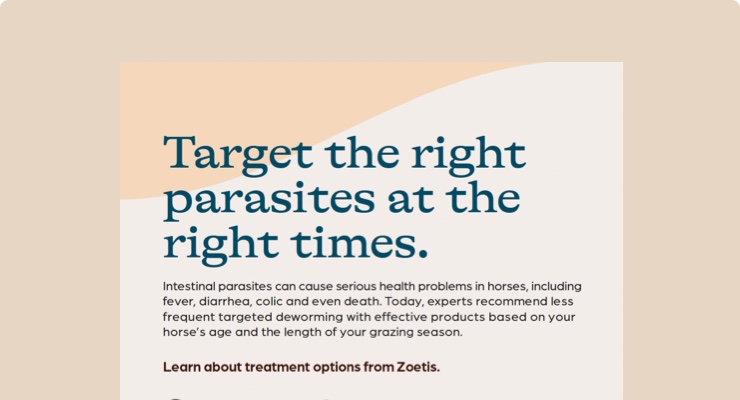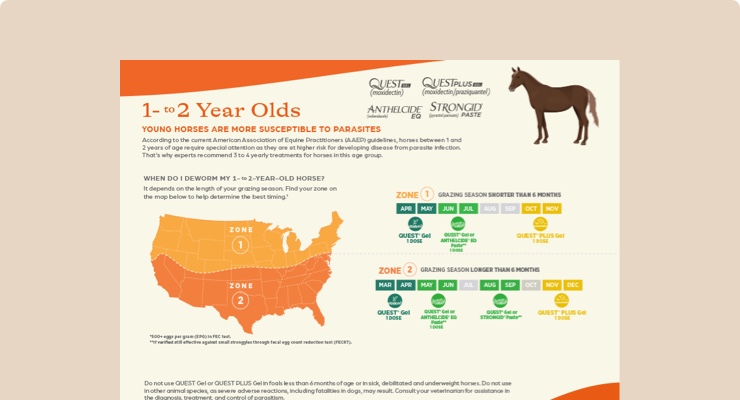Dewormer Brochure
A comprehensive overview of the available treatment options from Zoetis that are used to target the right parasites at the right times.
View Document

Intestinal parasites can cause serious health problems in horses, including fever, diarrhea, colic and even death. Using the most effective product at the right time is essential to lower the risk of parasite diseases, prevent resistance to dewormers, and control the shedding of parasite eggs.
Using the right dewormer, at the right time helps reduce parasitic resistance.1 Quest Gel is recommended in the early grazing season (spring). Experts agree that moxidectin, the active ingredient in Quest Gel is the treatment of choice at treating small stronglyes (including in encysted larval stages)1, the primary parasite of concern in horses over 9 months of age.1
Quest Gel has been evaluated as safe for use in breeding and pregnant mares, as well as in breeding stallions.
*Based on your location in the United States
In studies, moxidectin was significantly more effective than fenbendazole, the active ingredient in Panacur® POWERPAC at treating encysted small strongyle larvae.1 Moxidectin is also effective against large strongyles (bloodworms), bots, pinworms, hairworms and stomach worms. For late grazing season, learn more about our recommended dewormer Quest Plus Gel which also helps protect against tapeworms.1
Download the product comparison chart
| Product Name |  | Zimecterin®, IverCare®, Eqvalan®, Duramectin®, Bimectin® | Zimecterin Gold®, EquiMAX® | Safe-Guard®, Panacur® | Panacur® POWERPAC |
||||
|---|---|---|---|---|---|---|---|---|---|
| Active ingredients | Moxidectin | Ivermectin | Ivermectin & Praziquantel | Fenbendazole | 5-Day Double-Dose Fenbendazole | ||||
| Parasites | Most threatening to horses | Adult Small Strongyles |
|
|
|
**
|
**
| ||
| Encysted Small Strongyle Larvae |
|
**
| |||||||
| Adult Large Strongyles |
|
|
|
|
| ||||
| Migrating Large Strongyle Larvae |
|
|
|
| |||||
| Added coverage | Roundworms Most threatening to foals and young horses† |
*
|
*
|
*
|
|
| |||
| Bots |
|
|
|
||||||
| Pinworms |
|
|
|
|
| ||||
| Hairworms |
|
|
|
||||||
| Stomach Worms |
|
|
|
||||||
†Compared to labels of Zimecterin®, Zimecterin Gold®, Eqvalan®, IverCare®, Duramectin, Bimectin®, EquiMAX®, Safe-Guard®, and Panacur®.
*Per the 2024 American Association of Equine Practitioners’ Internal Parasite Control Guidelines, there is widespread roundworm (ascarid) resistance (lack of efficacy) to macrocyclic lactones (moxidectin and ivermectin). If macrocylic lactone resistance is suspected based on lack of clinical response, the 2024 American Association of Equine Practitioners Internal Parasite Guidelines recommends benzimdazoles (oxibendazole and fenbendazole) should be given.
**Per the 2024 American Association of Equine Practitioners’ Internal Parasite Control Guidelines, multiple studies show widespread small strongyle (cyathostomin) resistance (lack of efficacy) to benzimidazoles (fenbendazole and oxibendazole).
†American Association of Equine Practitioners. Internal parasite control guidelines. https://aaep.org/resource/internal-parasite-control-guidelines. Accessed June 24, 2024.
Zimecterin, Zimecterin Gold, and Eqvalan are registered trademarks of Boehringer Ingelheim Animal Health. IverCare is a trademark of Farnam Companies, Inc. Bimectin is a trademark of Bimeda Inc. EquiMAX is a trademark of Virbac. Safe-Guard is a trademark of Intervet Inc. or an affiliate. Panacur is a registered trademark of Merck Animal Health.
The Zoetis product quiz will help you determine the effective product to use at the most appropriate time of year to help maintain your horse’s health.
Treating your horse can be safe and effective by following the steps outlined in this short video.
Browse our collection of blog posts to learn how Quest Plus Gel and other Zoetis Equine products can help your horse receive the best care possible.

A comprehensive overview of the available treatment options from Zoetis that are used to target the right parasites at the right times.
View Document

Our adult horse guide includes recommendations for broodmares along with low and high shedders.
View Document

Foals require special care in their first year of life. View our customized dewroming schedule to help plan for timely treatments.
View Document

Young horses are more susceptible to parasites. See our comprehensive guide to deworming 1-to 2 -year-old horses.
View Document

Hang this poster in your practice or share with clients to educate them on the importance of deworming, including when, where and why.
View Document

Refer to or print this poster to better understand the importance of deworming, including when, where, and why you should do it.
View Document
We provide the most comprehensive range of equine dewormers to treat the most dangerous parasites for each life stages without over-deworming.

Multiple Parasites
OTC
(moxidectin/praziquantel)
Recommended for the end of grazing season. The only dewormer that treats encysted small strongyles, bots and tapeworms in a single dose, with broad-spectrum support that also treats large strongyles (bloodworms), pinworms, hairworms, and stomach worms. Easy gel formula dissolves on the tongue.

Roundworms in Foals
OTC
(oxibendazole)
Recommended for the essential treatment of roundworms (ascarids) in young foals at 2 to 3 months of age. Also effective against large stronglyes (bloodworms) and pinworms in adult horses.

Roundworms in Foals
OTC
(pyrantel pamoate)
Recomended for the important treatment of roundworms (ascarids) in foals at 4 to 6 months of age and 1 month post-weaning. Also effective against large stronglyes (bloodworms) and pinworms in adult horses.
Consult your veterinarian for assistance in the diagnosis, treatment, and control of parasitism.
Quest Gel & Quest Plus Gel
Do not use Quest Gel or Quest Plus Gel in foals less than 6 months of age or in sick, debilitated and underweight horses. Do not use in other animal species, as severe adverse reactions, including fatalities in dogs, may result.
References